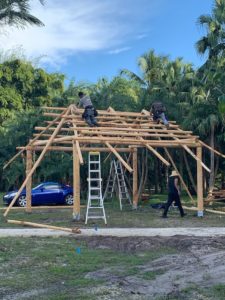“What you get by achieving your goals is not as important as what you become by achieving your goals.” – Zig Ziglar
Becoming and Being
“If you want to be a writer, you have to write. A writer is someone who writes.”
I was 16 years old when my father said those words to me. I was crushed.
Being a writer was all I’d ever wanted to be. And by pointing out the paucity of my literary output compared to the strength of my literary ambition, I felt like he was telling me that I had failed.
I’d written my first poem when I was about 8 years old, and had already decided that I would be a writer when I grew up. It was a single quatrain with a simple rhyme scheme (AABB), titled, precociously and pretentiously, “How Do I Know the World Is Real?”
Although I didn’t know it at the time, my father was a credentialed writer, an award-winning playwright, a Shakespearean scholar, and a teacher of literature, including poetry. I’d often seen him, weekday evenings and weekend mornings, hunched over student essays, muttering and occasionally reading out loud passages to my mother, who would give him a knowing smile.
I don’t remember how I drummed up the courage to show my fragile little poem to him, but I did. And the moment I did, I regretted it. But instead of the negative critique I was expecting, he put his hand on my shoulder, squeezed gently, and said, “You may have a talent for this.”
I wrote poetry and short stories in the years that followed, but I was not, as the cliché goes, obsessed with writing. I had other interests – touch football, the Junior Police Club, a burgeoning interest in girls, etc. As time passed, I wrote less and less. But in my subconscious somewhere, I still yearned to be a writer.
Like most wannabe writers, I rationalized the infrequency of my writing by telling myself that all these other activities were “life experiences,” and that I needed lots of them to become the writer I wanted to be. But in developing this excuse, I was building a structure of self-deception that many people live inside when they abandon their dreams.
I continued to write sporadically throughout my high school and college years. But it wasn’t until the mid 1970s, when I made the decision to take a job with a small publishing company in Washington, DC, that I began to write every day. And every day, my skills improved. If I hadn’t made the effort to take that job, I would have continued, as many wannabe writers do, to tell myself that I was making progress. To write occasionally but publish nothing.
I’ve been writing regularly now for about 45 years. There are still miles between the quality of my writing and that of really great writing, but I have earned a very good living from the writing I do. Good enough to call myself a professional writer.
So many people live their lives failing to become what they want to be because they don’t work on their goal on a daily basis. Whether it is fear or ignorance or laziness, or a bit of all three, they rationalize their lack of commitment with all sorts of seemingly reasonable excuses.
How many times have you heard someone say that they will travel the world or paint paintings or write a book…. one day? And when you hear that, what do you feel? Happy for them because you are confident that one day they will accomplish that long-held goal? Or sort of sad for them because you are pretty sure they never will?
And what about you? What is it that you want to be but haven’t become? What goal or project or task do you keep talking about accomplishing yet never do?
When my father told me that “writers write,” he was saying that I had lost the right to call myself a writer when I stopped writing. But, in retrospect, I can see that he was telling me something else, too – something even more important: I could regain the title the moment I started writing again.
We are at the beginning of another year. It’s as good a time as ever to get to work. You don’t have to give up your day job. You don’t have to put your family in second place. But you do have to begin to practice whatever it will take to become the person you want to be.


